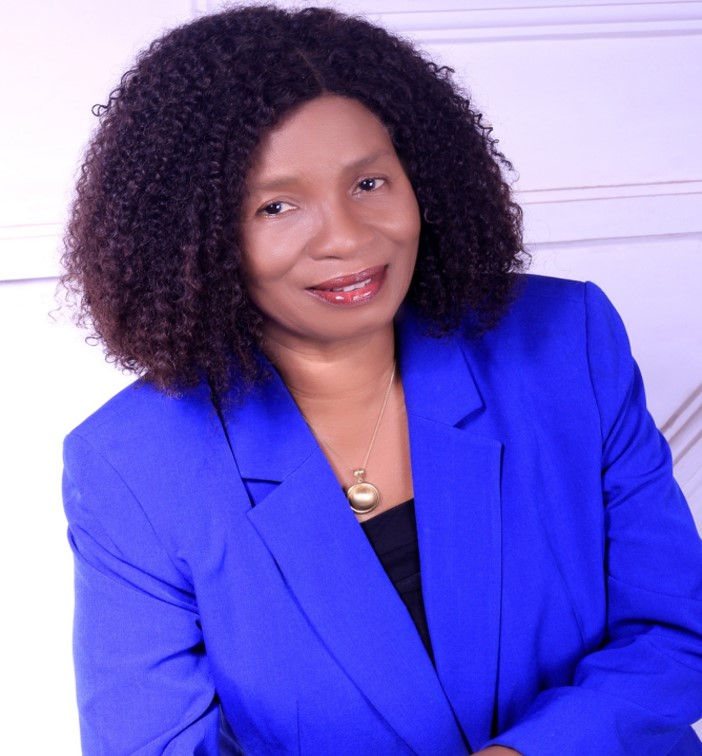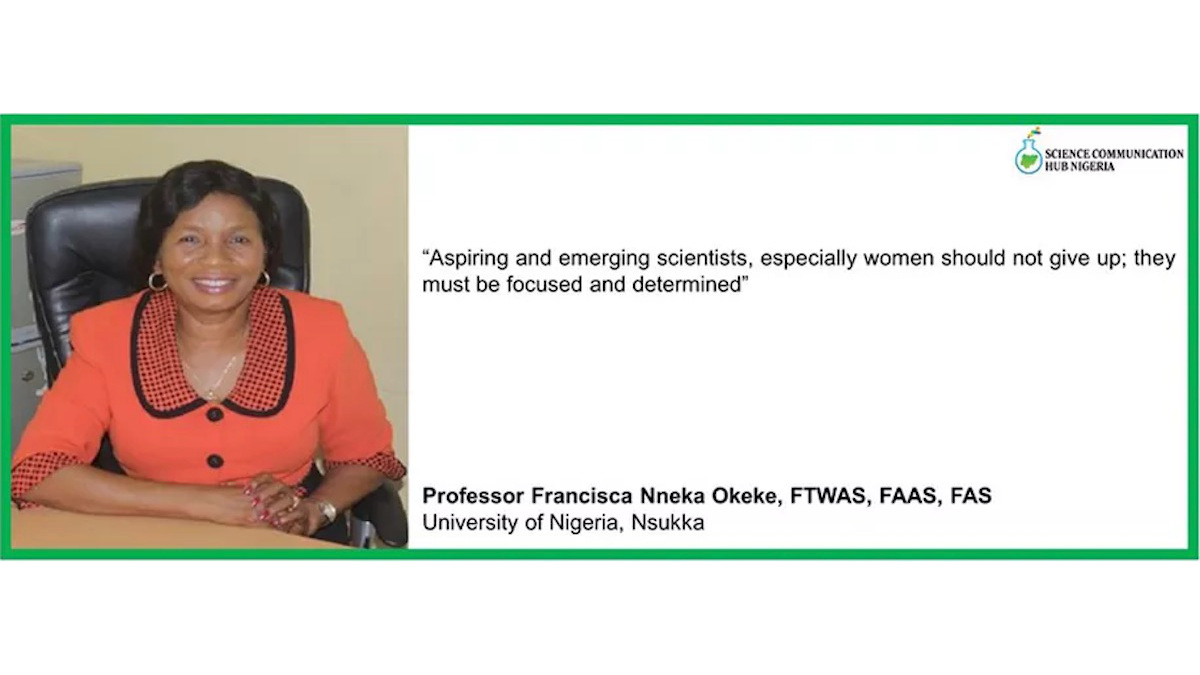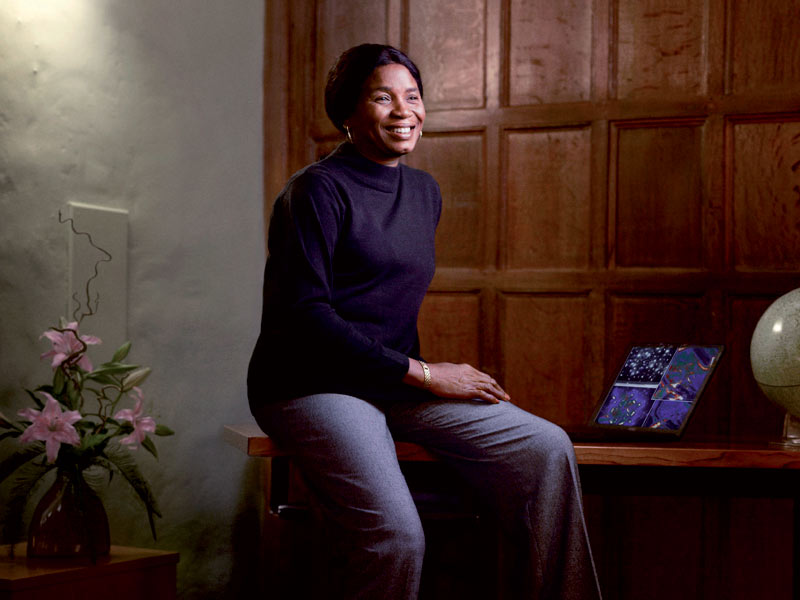Professor Francisca Nneka Okeke, a Nigerian physicist at the University of Nigeria, made history as the first woman to lead the university’s physical sciences faculty. She received the L’Oreal-UNESCO for Women in Science Award for her vital work on climate change. Her push for more women in the university brought in three new female faculty members. She keeps encouraging girls and women to join the world of science and tech. Professor Okeke has played a significant role in advancing physics education in Nigeria. Her textbooks and articles have greatly improved the teaching and learning of physics at both high school and university levels.
Early Life of Professor Francisca Nneka Okeke
Professor Francisca Nneka Okeke’s life revolves around curiosity, passion, and excellence. Growing up in Nigeria’s Anambra State, she was deeply influenced by her father, a mathematician and philanthropist. As a child, she wondered about the sky, its colors, and how aeroplanes could fly, sparking her interest in physics.
After high school, she unexpectedly found herself teaching physics to older students instead of pursuing medicine. Despite the challenge, she embraced teaching with enthusiasm. In an interview, she shared a turning point: a night spent solving a tough physics problem her students couldn’t crack for an important exam. Her breakthrough filled her with joy and confirmed her path into physics.
At 18, she married a renowned physicist named Professor Okeke. Together, they raised six children, all now pursuing science—a reflection of their shared passion for the field.
Breaking barriers throughout her career, she achieved several “firsts”
FIRSTS OF Professor Francisca Nneka Okeke
- The initial female Head of the Department of Physics and Astronomy
- The first female Dean of the Faculty of Physical Sciences
- The first indigenous woman to become a Professor in the Faculty of Science and Engineering at UNN
- The first female Physics Professor in East Nigeria.
- Directs ICCSEE-UNN, championing STEM
- Guiding women and girls in scientific pursuits.
Professor Francisca Nneka Okeke Awards
Recognized for her exceptional contributions, Prof. Okeke received numerous awards, including
- The L’Oreal-UNESCO 2013 Award for Women in Science for Physical Sciences.
- Her achievements highlighted in CNN’s “African Voices” segment in 2015
- Acknowledged by Nigerian academia in 2016 among the top 10 lecturers in research and publication at UNN.
Career Achievements

With an impressive academic record, she supervised 25 doctoral and 38 master’s students, fostering excellence among them. Her guidance led to two students winning the AU-TWAS Young Scientist Award in 2010 and the PG First VC’s Award for 2015-2016. Additionally, she has published 140 papers in international journals.
As a Fellow of the World Academy of Science, the Africa Academy of Science, the Nigerian Academy of Science, and the Japanese Society for Promotion of Science, Prof. Okeke’s influence extends globally. Her efforts in organizing workshops and speaking at international STEM conferences underscore her commitment to advancing scientific education.
STEM Gamechanger
One of the world’s foremost ionospheric geophysicists, Okeke has dedicated her career to investigating the Equatorial Electrojet, a current belt spanning the equatorial region.
Her research significantly contributes to understanding climate change and improving predictions of natural disasters like tsunamis and earthquakes. Her groundbreaking work earned her the UNESCO Women in Science award and a place among New African Magazine’s Top 100 Most Influential Africans.
“My childhood curiosity is the key to my remarkable achievements and my passion for science,” shares Francisca Nneka Okeke. “As a young girl, I marvelled at the sky’s transformations from white to blue. I pondered over the mechanics of flight, discovering that physics held the answers to my inquiries.”
Her commitment to gender equality and supporting girls in STEM fields stems from her early years.
“My childhood curiosity is the key to my remarkable achievements and my passion for science,” Okeke says. “From a young age, I was captivated by the skies’ mysteries, pondering why it shifted colors and how aeroplanes soared. Learning that physics could unravel these wonders was my calling.”
Her journey into science also led her to marriage at 18 to a respected physicist, who encouraged her aspirations when female academics faced societal resistance.
Pioneering Milestones

Pioneering milestones marked her career, including becoming the first woman to head a university’s physics and astronomy department and later being appointed as a dean.
“In the past, fields like physics were considered male-dominated, expecting women to be present but not vocal,” she reflects. “There was a belief that entering such domains would strip women of traits like passivity, emotionality, intuition, and receptivity that society deemed as ‘acceptable’ for women.”
She’s successfully mentored around 12 PhD and 28 Masters students. Inspired by her father’s nurturing of her passion for STEM and academic excellence, she instils a similar ethos in her mentorship. In an interview, she stressed the importance of female scientists developing a leadership style highly valued in their field. Francisca emphasizes warmth, empathy, and support in her mentoring, believing these traits encourage, not isolate, women in physics. By being accessible and relatable, she aims to inspire aspiring women scientists to follow her path, dismantling stereotypes in the physics realm. As she says, “Seeing is believing.”
Professor Francisca Okeke persists in empowering women to embrace their passions, even in male-dominated fields. She advocates for resources that bolster women across the STEM pipeline, from school-level aspiring scientists to established professionals contributing to organizational committees.



